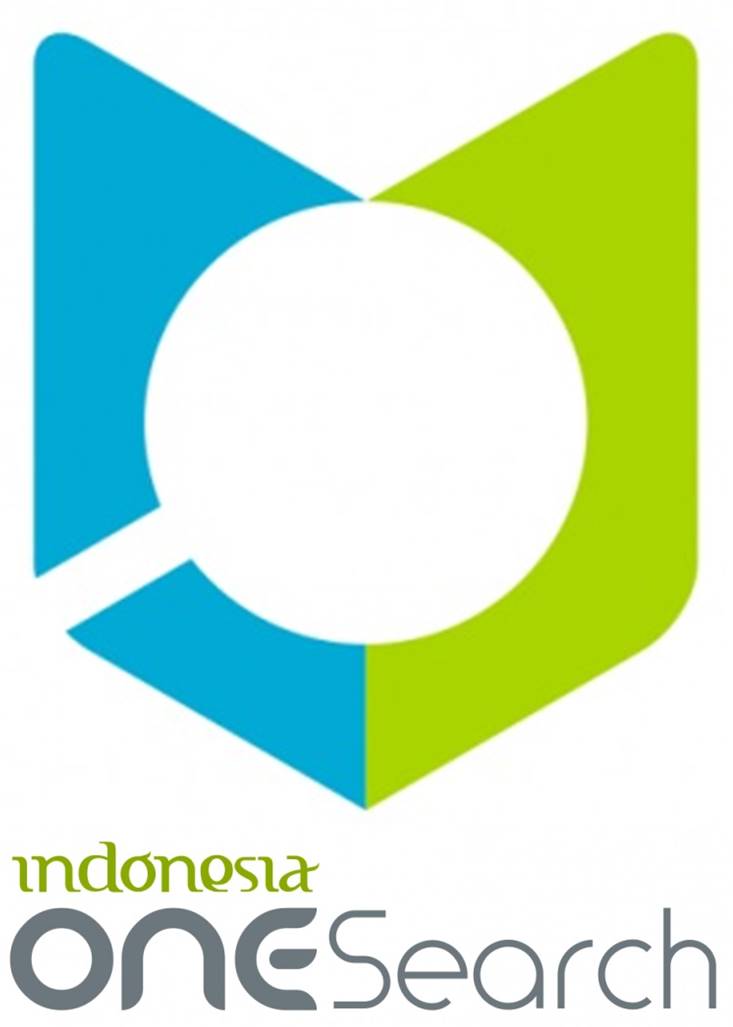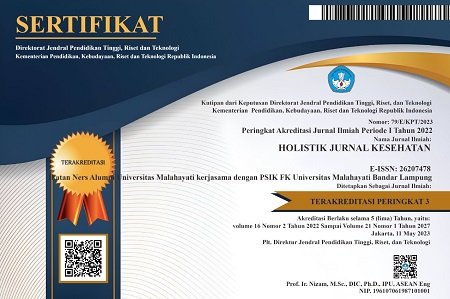Aplikasi kesehatan berbasis aplikasi seluler pada perawatan pasien gagal ginjal kronis yang menjalani hemodialisis: A literature review
Abstract
Bakcground: Chronic Kidney Disease is a progressive and irreversible disorder of kidney function. The use of technology for further health promotion in particular patient self care proposed by the field of mobile health applications offers new opportunities to support preventative care and disease monitoring tailored to individual needs and which is a promising means to deliver information and health intervention to individuals living with chronic health conditions.
Purpose: To provide an overview and ideas from the results of a literature review regarding the evaluation of the effectiveness of using mobile based health applications related to the care of chronic kidney disease patients undergoing hemodialysis.
Method: The form of a literatur review, database searches are carried out through, Science, Direct, Scopus, Pubmed, ProQuest and Sagebetween 2019-2023. Then filtering was carried out using PICO PICO (Population, Intervention, Comparative, Outcome) to obtain 10 suitable articles.
Results: From the results of the study and review of 10 selected articles, it was concluded that the use of mobile based health applications is effective and provides benefits in the treatment of chronic disease undergoing hemodialysis.
Conclusion: The use of mobile-based health applications related to the care of chronic kidney disease patients undergoing hemodialysis has the potential to improve the effectiveness of care and the quality of life of patients.
Keywords: Caring; Chronic Renal Failure; Dialysis; Mobile Application.
Pendahuluan: Penyakit ginjal kronis adalah gangguan fungsi ginjal yang progresif dan tidak dapat pulih kembali.Penggunaan teknologi untuk promosi kesehatan lebih lanjut khususnya perawatan diri pasien yang diusulkan oleh bidang aplikasi kesehatan seluler menawarkan peluang baru untuk mendukung perawatan pencegahan dan pemantauan penyakit yang disesuaikan dengan kebutuhan individu, serta merupakan sarana yang menjanjikan untuk menyampaikan informasi dan intervensi kesehatan kepada orang-orang yang hidup dengan kondisi kesehatan kronis.
Tujuan: Memberikan gambaran dan menganalisis hasil-hasil penelitian tentang evaluasi efektivitas penggunaan aplikasi kesehatan berbasis mobile yang berkaitan dengan perawatan pasien penyakit ginjal kronis yang sedang menjalani hemodialisis.
Metode: Penelitian ini adalah literature review. Penelusuran artikel akademik melalui Online Database (pencarian melalui Science, Direct, Scopus, Pubmed, ProQuest dan Sage dalam periode tahun 2019-2023). Kemudian dilakukan penyaringan dengan PICO (Population, Intervention, Comparative, Outcome) didapatkan 10 artikel yang sesuai.
Hasil: Dari hasil telaah dan review 10 artikel pilihan menunjukkan bahwa penggunaan aplikasi kesehatan berbasis mobile efektif dan memberikan manfaat dalam perawatan penyakit ginjal kronis yang menjalani hemodialisis.
Simpulan: Penggunaan aplikasi kesehatan berbasis mobile yang berkaitan dengan perawatan pasien penyakit ginjal kronis yang menjalani hemodialisis memiliki potensi untuk meningkatkan efektivitas perawatan dan kualitas hidup pasien.
Keywords
References
Amdie, F., & Woo, K. (2020). The use of mHealth technology for chronic disease management the challenges and opportunities for practical application.Wounds Int, 11(2).
de Oliveira, J. G. R., Askari, M., Junior, G. B.S., Filho, R. A.F, & Filho, J. E.V., (2019). Renal health: an innovative application to increase adherence to treatment through self-monitoring for patients with CKD and provide information for the general population. Kidney international reports, 4(4), 609-613.
Gonçalves-Bradley, D. C., Maria, A. R. J., Ricci-Cabello, I., Villanueva, G., Fønhus, M. S., Glenton, C., & Shepperd, S. (2020). Mobile technologies to support healthcare provider to healthcare provider communication and management of care.Cochrane Database of Systematic Reviews, (8).
Hidayangsih, P. S., Tjandrarini, D. H., Sukoco, N. E. W., Sitorus, N., Dharmayanti, I., & Ahmadi, F. (2023). Chronic kidney disease in Indonesia: evidence from a national health survey. Osong Public Health and Research Perspectives, 14(1), 23.
Hustrini, N. M., Susalit, E., & Rotmans, J. I. (2022). Prevalence and risk factors for chronic kidney disease in Indonesia: An analysis of the National Basic Health Survey 2018. Journal of global health, 12.
Indonesian Renal Registry. (2016). 9th Report Of Indonesian Renal Registry. Diakses dari: https://www.indonesianrenalregistry.org/data/INDONESIAN%20RENAL%20REGISTRY%202016.pdf
Jung, C. Y., Kim, Y., Kim, H. W., Han, S. H., Yoo, T. H., Kang, S. W., & Park, J. T. (2023). Effectiveness of a Smartphone Application for Dietary Sodium Intake Measurement.Nutrients, 15(16), 3590.
Khah, M. T., Farsi, Z., & Sajadi, S. A. (2023). Comparing the effects of mHealth application based on micro-learning method and face-to-face training on treatment adherence and perception in haemodialysis patients: a randomised clinical trial. BMJ open, 13(6), e071982.
Ko, D., Bratzke, L. C., & Roberts, T. (2018). Self-management assessment in multiple chronic conditions: A narrative review of literature. International journal of nursing studies, 83, 83-90.
Kosa, S. D., Monize, J., D'Souza, M., Joshi, A., Philip, K., Reza, S., & Lok, C. E. (2019). Nutritional mobile applications for CKD patients: systematic review. Kidney international reports, 4(3), 399-407.
Linton, A. D. (2015). Introduction to medical-surgical nursing.Elsevier Health Sciences.
Marin, A. E., Redolat, R., Gil-Gómez, J. A., & Mesa-Gresa, P. (2023). Addressing Cognitive Function and Psychological Well-Being in Chronic Kidney Disease: A Systematic Review on the Use of Technology-Based Interventions. International Journal of Environmental Research and Public Health, 20(4), 3342.
Markossian, T. W., Boyda, J., Taylor, J., Etingen, B., Modave, F., Price, R., & Kramer, H. J. (2021). A mobile app to support self-management of chronic kidney disease: development study. JMIR human factors, 8(4), e29197.
Miller, W. R., Lasiter, S., Ellis, R. B., & Buelow, J. M. (2015). Chronic disease self-management: a hybrid concept analysis. Nursing outlook, 63(2), 154-161
Narsa, A. C., Maulidya, V., Reggina, D., Andriani, W., & Rijai, H. R. (2022). Studi Kasus: Pasien Gagal Ginjal Kronis (Stage V) dengan Edema Paru dan Ketidakseimbangan Cairan Elektrolit: Case Study: Chronic Kidney Disease (Stage V) Patient with Pulmonary Edema and Fluid Electrolyte Imbalance. Jurnal Sains dan Kesehatan, 4(SE-1), 17-22.
Nugroho, S. A. (2021). Buku Ajar Anatomi Dan Fisiologi Sistem Tubuh Bagi Mahasiswa Keperawatan Medikal Bedah.
Palmisano, A., Angileri, S., Zito, M. P., Soekeland, F., Gazineo, D., Godino, L., & Mancin, S. (2023). Chronic kidney disease and mobile health: quality of renal nutritional APPs in Italy. Acta Bio Medica: AteneiParmensis, 94(4).
Sarker, M. H. R., Moriyama, M., Rashid, H. U., Rahman, M. M., Chisti, M. J., Das, S. K., & Faruque, A. S. G. (2022). Chronic kidney disease awareness campaign and mobile health education to improve knowledge, quality of life, and motivation for a healthy lifestyle among patients with chronic kidney disease in Bangladesh: randomized controlled trial. Journal of Medical Internet Research, 24(8), e37314.
Stec, M., & Arbour, M. W. (2020).Wellness and disease self-management mobile health apps evaluated by the mobile application rating scale. Advances in Family Practice Nursing, 2, 87-102.
Yang, Y., Chen, H., Qazi, H., & Morita, P. P. (2020). Intervention and evaluation of mobile health technologies in management of patients undergoing chronic dialysis: Scoping review. JMIR mHealth and uHealth, 8(4), e15549.
Zwi, S., Isautier, J., Webster, A. C., Lambert, K., Shepherd, H. L., McCaffery, K. J., & Muscat, D. M. (2022). A feasibility study of a best practice health literacy app for Australian adults with chronic kidney disease.PEC Innovation, 1.
DOI: https://doi.org/10.33024/hjk.v17i8.13033
Refbacks
- There are currently no refbacks.
Copyright (c) 2023 Holistik Jurnal Kesehatan

This work is licensed under a Creative Commons Attribution-NonCommercial 4.0 International License.














